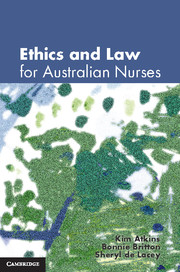Book contents
- Frontmatter
- Contents
- Introduction
- 1 Understanding the human person
- 2 Understanding legal rights and obligations
- 3 Nursing and the legal system
- 4 The nurse–patient relationship
- 5 Consent
- 6 Duty of care and professional negligence
- 7 Patient information, confidentiality and trust
- 8 ‘Trust me, I’m a nurse’
- 9 Witnessing and making mistakes
- Appendix: Tables of legislation
- References
- Index
1 - Understanding the human person
- Frontmatter
- Contents
- Introduction
- 1 Understanding the human person
- 2 Understanding legal rights and obligations
- 3 Nursing and the legal system
- 4 The nurse–patient relationship
- 5 Consent
- 6 Duty of care and professional negligence
- 7 Patient information, confidentiality and trust
- 8 ‘Trust me, I’m a nurse’
- 9 Witnessing and making mistakes
- Appendix: Tables of legislation
- References
- Index
Summary
LEARNING OBJECTIVES
In this chapter, you will:
Develop your appreciation of the complexity of the concept of ‘person’
Develop your understanding of ‘personhood’ as a relation between biological, interpersonal and social aspects of a human being
Develop an understanding of human vulnerability, and how this makes possible the capacity to care for each other
Gain a sense of the ways in which your beliefs about yourself affect your capacity to care for yourself and others
In 2004, the Chief Justice of the Family Court of Australia, Alistair Nicholson, made a determination that a 13-year-old child (known as Alex) could proceed with medical treatment that would permanently change that child's gender from female to male. Justice Nicholson noted that Alex had the physical appearance of a girl and normal female chromosomes, but had a ‘longstanding, unwavering and present identification as male’ (Re Alex [2004] FamCA 297, para 80).
In coming to a coherent determination of what was in Alex's best interests, Justice Nicholson gave due consideration to Alex's personal and family history; Alex's subjective perception of his situation; the nature of Alex's relationships with family and friends; and the relevant scientific and medical information pertaining to Alex's mental, physical and sexual health.
Experiences such as Alex's raise questions about the nature of human identity:
What is the connection between the physical body and a person's psychological outlook?
What part do early life experiences play in shaping a personality?
What part do social influences play in shaping a personality?
Is there an essential defining quality that all persons share?
Is there a proper or an improper way to be a male or female?
Where do we get our ideas about persons and gender, as well as what is proper or improper?
As a nurse, you will be called upon to support, care for and protect people who are vastly different from yourself. How you respond to the diversity of human beings will be a measure of your own humanity as well as your professionalism. Certainly, caring does not come as easily to some nurses as it does to others. After all, it is not always pleasant being around incapacitated, sick or grieving people. So why do people want to support the ill or incapacitated? What is it about human nature that causes people to care for each other at all?
- Type
- Chapter
- Information
- Ethics and Law for Australian Nurses , pp. 7 - 32Publisher: Cambridge University PressPrint publication year: 2011



